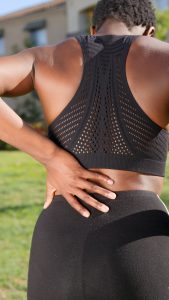 Whether I see clients personally in Houston, TX, or work with them online, I always hear the same question. “When do my muscles quit getting sore after a workout?” Everyone has had sore muscles at one time or another. The more fit they are, the less frequent and less dramatic the muscle pain is. That’s because people new to fitness have more potential for growth. Don’t give up if you find your muscles hurt the next day. There are quick fixes for sore muscles that can get you back to your workout pain free.
Whether I see clients personally in Houston, TX, or work with them online, I always hear the same question. “When do my muscles quit getting sore after a workout?” Everyone has had sore muscles at one time or another. The more fit they are, the less frequent and less dramatic the muscle pain is. That’s because people new to fitness have more potential for growth. Don’t give up if you find your muscles hurt the next day. There are quick fixes for sore muscles that can get you back to your workout pain free.
There are two types of muscle pain.
Your pain may be immediate soreness or a more debilitating type of muscle pain that occurs between 24 and 72 hours after you workout, called DOMS—delayed onset muscle soreness. The first type of muscle pain occurs right after you workout and quickly dissipates. A massage, steam room, swimming or bathing in cold water, or a heating pad can help bring relief. There are patches that provide lidocaine or other pain reliever like capsaicin or methyl salicylate. Put the patch on the sore muscles. You can wear them under your clothing and unless they have a strong menthol scent, nobody will know.
Do active recovery.
For that muscle pain that starts the next day or that lasts longer doesn’t mean you have to give up all activity. In fact, active recovery can help relieve it. What is active recovery? It’s doing mild exercise, like taking a walk or leisurely riding a bike. You might find that repugnant at first, but it really works. It helps speed the recovery process by boosting circulation and working the muscles lightly.
Consider a massage gun.
Massage guns are relatively new to the scene when you compare them to heating pads or even traditional massages. However, they do work. Always follow the manufacturers recommendations regarding how long to use it, and when you shouldn’t. Athletes often use massage guns to deal with muscle injuries or to boost circulation to boost recovery to improve their performance. They’re shaped to easily use on yourself. They also can help you relax and get better sleep, which is also healing.
- You can go traditional and take mild pain relievers like ibuprofen. If you want to prevent muscle pain, consider drinking a cup of coffee before a workout. Studies show it can reduce the potential of pain by 50%.
- Stretching before you workout can help prevent muscle pain, but if you do have it, mild stretching can also help quickly fix the problem. It’s considered another form of active recovery.
- Hydrate and hydrate often. Drink plenty of water during the workout to help prevent soreness and afterward to flush out lactic acid build up. It can help lubricate the joints and speeds the recovery process.
- There’s a time when you should seek advice from a professional. If the pain causes you to be weak, dizzy, or have breathing difficulties or doesn’t disappear after five to seven days, call your health care professional.
For more information, contact us today at Reggie C Fitness
